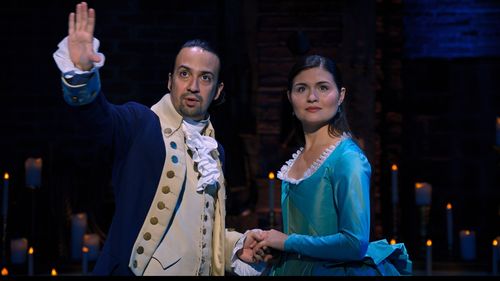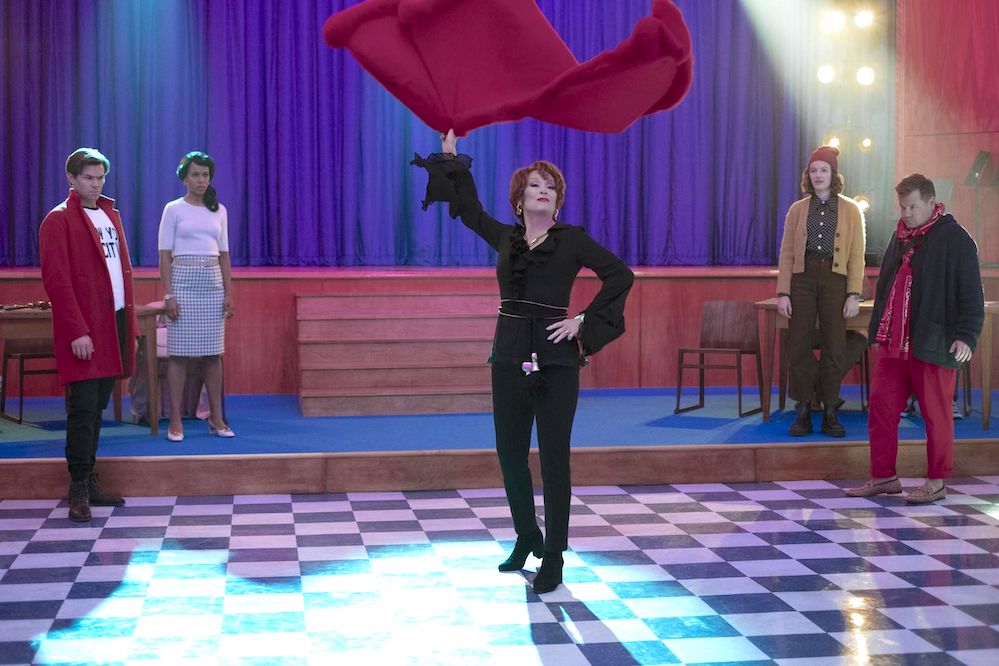By: Patrick Gratton

At long last, the second phase of the awards race is well underway. This past week we had Globe and SAG and Critics Choice nominations and then the Oscar shortlists. Normally all of this takes place earlier but this season is elongated and fragmented to. Originally, I though that the abnormality of this race would give way to industry groups following the critic’s leads and anoint, say, Riz Ahmed, Carey Mulligan, Paul Raci, and Youn Yuh-jung, as frontrunners following the critical tallies. Clearly I was wrong, The HFPA saw this possible route, and instead chose violence.
First things first, let’s just contextualize the Comedy or Musical designation within the framework of the Golden Globes themselves. The drama/comedy division of Picture and Lead Acting awards by genre started in 1951, when the HFPA awarded both A Place In the Sun and An American In Paris as their "Motion Picture, Drama" and "Motion Picture, Comedy or Musical" winners. The HFPA would later divide Motion Picture Comedy and Musical into separate categories in 1958, only to reinstate the category as we know it in 1963...
The Comedy or Musical wing of the Globes are often stigmatized as “lesser”, or lacking the same prestige, in comparison to their drama counterparts. Films sweeping the Drama branch have a greater chance of future Oscar wins, while the Comedy or Musical winners end up making par at best, or seen as an insular “Globes gonna Globes” at worst. In the past twenty-years, only four films have won both the Motion Comedy or Musical Golden Globe and the Best Picture Oscar, only two actors and five actresses have won both awards in the equivalent fields, and Catherine Zeta-Jones has the asterisk of losing the Actress In a Comedy or Musical Globe before winning the Supporting Actress Oscar for Chicago.
Let’s go over the nominees and dissect from there...
Musical or Comedy
Actress, Musical or Comedy
- Maria Bakalova, Subsequent Moviefilm
- Kate Hudson, Music
- Michelle Pfeiffer, French Exit
- Rosamund Pike, I Care A Lot
- Anya Taylor-Joy, Emma.
Actor, Musical or Comedy
- Sacha Baron Cohen, Borat Subsequent Moviefilm
- James Corden, The Prom
- Lin-Manuel Miranda, Hamilton
- Dev Patel, Personal History of David Copperfield
- Andy Samberg, Palm Springs

This year, due to the fact that the HFPA has been handed a deck of cards pitted against them, their Comedy or Musical roster is bleaker than usual. Stats will show that, in the modern era, for a film to be nominated or win in the Comedy or Musical Globe category and then win the Best Picture Oscar, the film needs to land on both the AFI and NBR top 10 lists. Since 1999, of the 30 films that got both C/M and BP nominations, only five films missed both citations. With the exception of The Grand Budapest Hotel, which would win the Globe then lose the Oscar to a fellow Comedy or Musical nominee Birdman, the remaining 4 films lost the Globe before getting a Best Picture nomination alongside the films they lost to. So the theory goes that a strong Comedy or Musical contender could piggy back another on their shoulder. Excluding Hamilton’s special AFI citation, this year marks the first year since AFI launched their top 10 list in 2000 that none of the Comedy or Musical nominated fields were cited on either the AFI or NBR lists.
In short, it's a weak field, not only for the five films, but for the nominated performances, starting with a dormant male acting race. Corden had the good fortune of leading a film that’s contending for other awards (more on that later), but his inclusion surely isn’t founded on quality or merit. Viewers leave the film finding the performance either lazy or offensive, depending on their mileage for dated 90s caricatures.
Dev Patel has a British Independent Film Awards nomination as a feather in his cap, but that nomination was at the start of the 2019 season, and he missed out on a BAFTA nomination during its eligibility cycle. As the titular character in the Dickens adaptation, Patel spreads himself too thin, lacking the comedic timing to deliver Iannucci’s satirical diction while also struggling to juggle the role’s broad humor and its deadpan straight man center; It's admittedly a difficult task.

Miranda, and Hamilton as a whole, will be regarded in the rearview as an anomaly, as the Disney+ recording of the Tony-winning phenomenon is ineligible for the Oscars and has been relegated to the television branch of both the SAG and Critics’ Choice Awards.
Samberg gives a performance which, while more nuanced than his standard Lonely Island fare, still plays as a slight variation of his comedic brand, only with a hint of maturity, pathos and overall sex appeal. If nothing else, this nomination is a way to offer a nod to a previous host and an undervalued comedian, for a vehicle that could possibly propel his film career.
We should note that the field could have been stronger. Bill Murray frauded himself to the supporting category for On The Rocks (and landed the nomination) but in doing so he may have missed out on a surefire Globe win with a truthful campaign.
Likewise, the female acting category leaves much to be desired, defined as much by who was excluded as who was included. Let’s deviate and discuss who was excluded, and dive into the non-Merylness of it all. Meryl Streep is the queen bee of the HFPA, with 8 Globe wins and 32 nominations to her name. With that in mind, it’s staggering that the Globes omitted the legendary actress not once but twice in this category, for both Let them All Talk and The Prom. Some may theorize that a case of vote splitting between both performances might have occurred, but the total rejection of Let Them All Talk throughout the season so far negates that theory. Her snub for The Prom might be indicative that The Prom’s narrative as a populist crowd pleaser was premature. But let’s leapfrog back to the main C/M category for a second and talk about both The Prom and Meryl’s chances going forward. Neither the film nor the performance were nominated at SAG, nor were they longlisted at BAFTA. We need to lay the Meryl Oscar talks to rest: it’s inconceivable for her to get an Oscar nomination without a Globes or SAG nomination, so that’s off the table. The Prom would have needed a SAG nomination to make good on its populist narrative. What is left is a hail mary where the film either miraculously manages a PGA nom, or if the Art Directors, Cinema Audio Society, Costume Designers or the Motion Pictures Sound Editors guilds and resulting Academy branches unilaterally rally around the film giving it a #8 or #9 spot on the Best Picture ballot. In either case, those scenarios require extreme mental gymnastics.

But let’s circle back to who was nominated in a category that inadvertently reflects not only the HFPA as an organism, but the mechanics defining this award season as a whole. Full disclaimer, French Exit, I Care a Lot and Music are my three remaining blindspots among this field of nominees. It’s fair to assume that Taylor-Joy’s nomination for her brittle yet slightly hollow take on Emma, the Jane Austen heroine, is further evidence that she’ll win her other Globe nomination for Best Actress in a Limited Series, Anthology Series or Motion Picture Made for Television Category.
Pfeiffer was always going to have an uphill battle with French Exit, given that the role is an icy one in a film that met mixed reception, but Sony Pictures Classics archaic distribution model has left her chances stranded at sea. It’s not like she was ever going to get the award season coronation a la Julianne Moore, but it’s becoming ever clearer that Sony Pictures Classic had little to do with Moore’s award season trajectory, and Pfeiffer needed the sort of campaign that SPC rarely affords to its contenders nowadays.
It’s already been stressed that Sia’s Music, one of three female directed films to get nominated for Motion Picture of the year with both Nomadland and Promising Young Women nominated in the Drama category, is this year’s WTF nomination. But it’s fairly easy to answer the perplexing question of Music’s inclusion. If nothing else the HFPA loves getting schmoozed and sometimes the best way to the HFPA’s heart is a precise campaign for their attention. But if we’re veering into starfucking territory, is Kate Hudson really the type of fuckery that will boost ratings? If this is their raison d’être, why is starfucking c. 2001 the answer? If this isn’t starfucking, then why is Hudson holding a spot that could have gone to Streep, or to Palm Springs’ stealth MVP Cristin Milioti. Milioti not only expands her role past mere audience surrogate, she grounds the film’s high concept plotting and strengthens her repertoire as an electric comedienne. Which isn’t to take anything away from Samberg’s performance -- the film hinges on their nuanced duet -- but Milioti steps out of her comfort zone in a way Samberg surely doesn’t.

Speaking of smashing duets, it’s fair to assume that the frontrunners in both acting categories are Borat Subsequent Moviefilm’s Baron Cohen and Bakalova. Most of the Comedy/Musical nominees will find their award trajectories beginning and ending at the Globes, but Bakalova is the expected outlier. She’s hoping to follow the Zeta-Jones route, going lead at the Globes and running in the supporting race everywhere else. Her Oscar prospects are divisive amongst pundits, highlighting a potential critic-industry divide amongst voting bodies. Yet that divide hasn't come to pass. Both Bakalova and Young Yuh-jung were nominated at SAG and made the BAFTA longlist. Bakalova’s recent win at the London Film Critics Circle Might be indicative that a BAFTA momination is within reach.
All this talk of divides leaves us to one Glenn Close. The old guard will surely rally around this legendary overdue bridesmaid of all overdue bridesmaids, while the new guard might be more drawn to the novelty behind Bakalova’s performance, blending performance art, narrative slapstick and sketch comedy as one. Those who say that Borat Subsequent Moviefilm’s sketch comedy aesthetic is too new wave to be embraced by the Academy forgets that 1) Borat was embraced by the Academy, 2) the film hit the zeitgeist while riding the wave of anti-Trump sentiment and 3) The Academy has shown over and over again that they are hospitable to young ingénues who give breakthrough debuts.
Strangely enough, Bakalova’s high wire performance, while the film’s strongest asset, leaves Baron Cohen paling in comparison. Baron’s revival of his Borat persona lacks the bite that defined the character in previous iterations. The dust has settled on Baron Cohen’s antics: once Bakolova’s Tutar separates from her father, he’s left stranded in tired material, not only recycling the film’s 2006 predecessor but rehashing his adjacent Showtime sketch series Who Is America? as well. Despite all that he'll surely win the statuette. This will be seen as a blip on the award season spectrum, a way to gain more visibility towards his Supporting bid for another dated performance in Trial of the Chicago 7, this one in the guise of a civics lesson instead of sketch comedy.

If nothing else, this year’s roster of nominees outlines an industry on the precipice of a paradigm shift. If the Comedy or Musical wing is meant as a safe harbor to honor populist cinema, the question we have to ask ourselves is “How does one measure a film’s popularity or the audience’s response, without a sustainable theater going experience?” This year’s nominees don’t so much speak to the density of this year’s breadth of competition, as much as they questions the category’s mantra and its bias in catering to a certain type of film. Three of these five nominees films fit the classic HFPA bill. Borat is a zeitgeist hit and The Prom is the crowd-pleasing musical. Palm Springs runs behind as the WOM summer counterprogramming hit. I apologize, but Hamilton by design is not a narrative film and Music was nominated on a technicality of having a succession of musical numbers within its narrative framework. Say what you want about The People Choice Awards, but at least it gave its top prize to Bad Boys for Life, a film that 1) is still the highest grossing film of the year, 2) revitalized the goodwill for the franchise and 3) is a wiser attempt at starfucking then any of the choices in the Comedy / Musical slot not starring Meryl Streep or Nicole Kidman.
The truth is that my assumption that the Comedy or Musical wing “is meant as a safe harbor to honor populist cinema” was incorrect. There is no safe harbor. The disparity between populist taste and industry accolades broadens every year. Maybe the problem is twofold. Voting bodies take their role as gatekeepers of “taste and merit” to heart, looking down on popular comedy as something beneath them. The Studio system for their part, has no faith in the modern day audiences, serving the broadest product to consumers. You don’t have to watch films like Superintelligence or Like a Boss, to realize that Tiffany Haddish or Melissa McCarthy deserve better star vehicles. If nothing else, the studio model has grown sheepish of giving stars their non-IP four quadrant vehicles in the past two decades and films like As Good As It Gets or Jerry Maguire don’t get made anymore. Or maybe the paradigm of the American award season is, well, too American. Had The Twentieth Century not changed a single frame, but been about American political history instead of Canada, perhaps it would have swept these categories. Maybe the Hollywood Foreign Press Association should prioritize the F in HFPA and broaden their horizon to include comic fare from other countries.